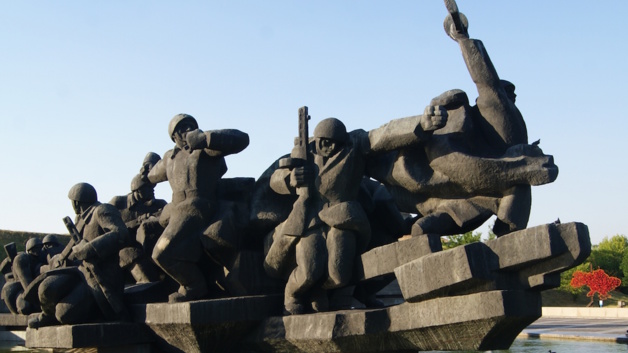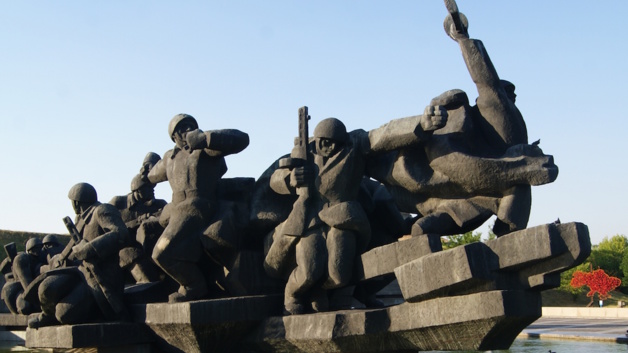
Credits RR
Ukrainian authorities have recently threatened to forbid entry into Ukraine and to sentence anyone entering Crimea without local permission, questioning the province’s attachment to Russia and considering it an occupied zone. These penal measures are the reflection of the post-Maidan legislative arsenal which has developed to counter Russian influence on the country’s future. If entry into Crimea without first passing through Ukrainian customs legitimately constitutes an offence from the point of view of Ukraine, even more questionable decisions have been made these last months to reevaluate Russia’s role in Ukrainian historical memory, once again in order to damage the popularity of the "Russian Bear". We are speaking of memorial laws of "decommunisation". This does not only mean remodeling a national memory; these measures have very real consequences on the lives of Ukrainians.
While some believe that Russia’s new objective is to spread chaos in Ukrainian political life and to prevent a resolution in the war in East Ukraine, paranoia is spreading, and everything associated with Russia, near or far, is viewed with distrust. In fearing an internal enemy, Ukraine’s Soviet heritage really takes the rap. Thus, on April 9th, the Supreme Rada (Ukraine’s parliament) adopted a law banishing Communist or Nazi propaganda, which means eliminating all depictions of the hammer and sickle which decorate many façades and historic monuments.
Concealing Soviet heritage
The imprint of the Soviet past is so omnipresent that this undertaking could be described as Stalinist. This ranges from renaming entities such as the Football Club Illichivets Mariupol, forced to abandon the surname of Bolshevik leader Vladimir Lenin, to dismantling the frescos which adorn the Kiev metro and removing the Communist emblems on the gates to Ukraine’s parliament and Ministry of Foreign Affairs. Wishing to act urgently, the law set June 21 as the deadline for all symbols to disappear; otherwise offenders face five years in prison. Still, this is without considering long deliberations such as the case of the football club mentioned above, which decided to rename itself via an online voting system. The same goes for the gigantic and emblematic 62-metre-high Motherland Monument, which commemorates Kiev’s liberation by the Soviets and which is quite hard to get rid of. However, it seems that monuments commemorating the 1944 liberation will be left alone.
Regardless of the operation’s scale, the law is applied without making waves, except for some voices which regret seeing such an altered architectural patrimony. It even benefits from a certain level of popular support. In fact, these measures recall the dynamic questioning of Soviet heritage which arose during the fall of the iron curtain. That is how Volodymyr Vatrovych defends his bill, speaking of a “memorial shock” allowing “gains in democratisation”, like in the former republics. With regard to democratisation, some rise up, even doing without academic debate. The financial aspect of such a law has not been thought over either: while streets named Lenin are often renamed in dedication to the “heroes of Maidan”, the cost of replacing street, district, village and city signs weighs heavily upon towns and cities already lacking those means.
Memorial laws to impose a single interpretation of history
The ambiguity of the law which sanctions Communist and Nazi propaganda is even more problematic. If Kiev’s stated goal is to shatter Russian accusations of a new regime infiltrated and supported by Neonazis, there follows a strong restriction on the freedom of expression and association. Indeed, in punishing the denial of “the true nature of the Communist regime”, this law imposes a Manichean history, while another of these “decommunisation” laws makes it illegal to question the legitimacy of the heroes of Ukraine’s 20th-century independence movement. Then how should one consider the Ukrainians in the Soviet army fighting against Nazi invaders to liberate Ukraine? Another piece of history which turns down this duality: the Ukrainian Insurgent Army (UPA) formed in 1942 had actually fought for independence, targeting Ukrainians in the Red Army, but its reputation is tinted with a virulent anti-Polish nationalism, exacerbated by the Nazi occupiers, which led to massacres of 80,000 Polish civilians in 1943. Thus, among independence fighters, some were arbitrarily raised from mere heroes to indisputably legitimate figures.
Furthermore, these laws could very well sanction media and political parties likely to value some kind of Soviet-era heritage. The Ukrainian chapter of Amnesty International spoke up against measures that it judges populist and restrictive of fundamental rights. Others see in the laws a means for Prime Minister Arseniy Yatsenyuk to create a diversion in the face of corruption scandals. Hannah Hopko–co-author of the laws and believer that if they had been enacted towards the end of the Soviet era, today’s crisis would not have happened–rejects these accusations and denounces any attempts at manipulation.
An attack on pluralism
Nonetheless, the first victims to bear the cost of this law against Soviet propaganda are the Ukrainian communist parties, recently banned from the political and electoral processes by a decree from July 24th. Secretary of State Pavlo Petrenko congratulated himself on the matter, speaking of “an historic act of justice”. Faced with criticism, he assured himself that the decision had been made on the basis of evident proof collected by the SBU (Security Service of Ukraine) and that the Communist Party gave support, financial included, to the separatists in East Ukraine. But, to this day, none of this proof has been publicised and nothing indicates that this ban is based on anything but the law forbidding communist symbols. If Ukraine does not change anything, it is very likely that the European Court of Human Rights will reprimand this law, even though the dissolution of a party is only possible when its activities are called into question, and not because of its name or visual identity. If there is proof that the Communist Party has been complicit in criminal activities, then the perpetrators could be tried in court, without any agreement on the law.
These attacks on pluralism and the attempt to impose a singular narrative of Ukrainian history says a lot about the destabilisation of a country that has not yet recovered from Euromaidan. Ukraine is trying out democracy, but it is being overtaken by a Russian part of its population that has stood as a minority by historical accident and which remains very close to Russia. These hastily adopted “decommunisation” laws may still have caused something which may turn out to be beneficial for moving on and accepting a troubled past: the public declassification and opening of secret Soviet-era police archives. With the help of the Institute of National Remembrance, Ukrainians can finally obtain information on missing relatives, likely persecuted by the Committee for State Security, the Ukrainian branch of the KGB, the emblem of Soviet terror.
Finally, the uncertainty which weighs upon Kiev in relation to Russian separatists and Russia’s involvement in the conflict in East Ukraine resulted in hastily adopted measures. Eager to defend its independence, Ukraine is imposing a reevaluation of its history in order to blot out its Soviet past. No one will deny the oppressive character of an inhumane regime, which gave place to the great famine of 1932, resulting in the loss of millions of Ukrainians. Furthermore, many people do not consider all the aspects of the 1917-1991 regime as criminal. It is useful to remember the famous declaration of Vladimir Putin who feels that “anyone who regrets the collapse of the Soviet Union has no heart, but those that want it back have no brain”. Nowadays, just like some Russians, there are Ukrainians, mostly in the South and the East, who cannot swallow the collapse of the Soviet Union, which, for many, bounded with hope. It is not certain whether such laws will reconcile a Ukraine which looks westward and another Ukraine historically tied to Russia.




























